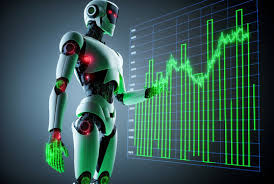In the realm of financial markets, Forex trading stands as a lucrative yet highly volatile domain. With trillions of dollars exchanged daily, it’s an arena where fortunes are made and lost in the blink of an eye. However, navigating these turbulent waters has become increasingly sophisticated with the emergence of technology-driven forex robot, particularly Forex robots.
Forex robots, also known as Expert Advisors (EAs), are automated trading systems programmed to execute trades on behalf of traders. These algorithms are designed to analyze market conditions, identify trading opportunities, and execute trades with precision and speed, all without human intervention. The allure of Forex robots lies in their promise of eliminating emotional biases, executing trades based solely on predefined parameters and algorithms.
The adoption of Forex robots has surged in recent years, propelled by advancements in artificial intelligence, machine learning, and algorithmic trading strategies. These sophisticated algorithms can analyze vast amounts of data in real-time, enabling traders to capitalize on fleeting market opportunities that would otherwise be missed by human traders.
One of the primary advantages of using Forex robots is their ability to operate 24/7, unlike human traders who are subject to fatigue and emotional biases. This round-the-clock operation ensures that trading opportunities are never missed, even in the most volatile market conditions. Moreover, Forex robots can execute trades with lightning-fast speed, reacting to market fluctuations in milliseconds, a feat that is virtually impossible for human traders.
Another key benefit of Forex robots is their consistency in adhering to trading strategies. Unlike human traders who may deviate from their strategies due to emotions or external factors, robots execute trades based solely on predefined rules. This disciplined approach minimizes the impact of emotional biases such as fear and greed, leading to more consistent trading results over the long term.
Furthermore, Forex robots offer unparalleled backtesting capabilities, allowing traders to evaluate their strategies using historical market data. By backtesting their algorithms, traders can assess the viability and robustness of their trading strategies before deploying them in live markets. This iterative process of optimization ensures that Forex robots are constantly evolving and adapting to changing market conditions.
However, despite their numerous advantages, Forex robots are not without their limitations and risks. One of the primary concerns associated with automated trading systems is over-optimization, wherein algorithms are fine-tuned to perform exceptionally well on historical data but fail to generalize to future market conditions. Traders must exercise caution and employ robust risk management practices to mitigate the risk of substantial losses.
Moreover, the reliance on algorithms poses inherent risks, particularly in highly volatile market conditions or during unforeseen events such as economic crises or geopolitical tensions. While Forex robots are designed to adapt to changing market conditions, there is always a possibility of unexpected market behavior that may lead to significant losses.
Additionally, the proliferation of Forex robots has given rise to a market saturated with numerous offerings, ranging from highly sophisticated algorithms developed by financial institutions to off-the-shelf solutions marketed to retail traders. Traders must conduct thorough due diligence and select reputable Forex robots with a proven track record of performance and reliability.
In conclusion, Forex robots represent a paradigm shift in the way traders approach the foreign exchange markets. By harnessing the power of automation and technology, traders can execute trades with precision, speed, and consistency, thereby maximizing their potential for profit. However, it is essential to recognize the inherent risks associated with automated trading and exercise caution when deploying Forex robots in live markets. Ultimately, success in Forex trading requires a combination of robust strategies, diligent risk management, and a deep understanding of market dynamics, whether executed by human traders or automated algorithms.


